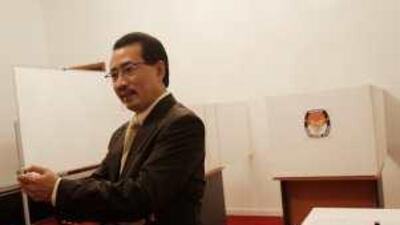ABU DHABI // Thousands of Indonesian expatriates are expected to visit their diplomatic missions here today to vote for the country's next president and vice president. In the run-up to the second democratic election in South East Asia's biggest economy, nationals emphasised the importance of casting their vote.
Several highlighted the importance of political stability and called for more time to be given to the country's existing leadership. The incumbent president, Susilo Bambang Yudhoyono, won Indonesia's first direct presidential election in 2004 and is the strong favourite to win a second term. Despite last-minute doubts over the reliability of the voter lists, the election is expected to proceed as planned. Registered voters will select from three pairs of presidential and vice-presidential candidates: Mr Yudhoyono and Boediono, a former central bank governor; the vice president, Jusuf Kalla, and Wiranto, a retired army general; and the former president, Megawati Sukarnoputri and Prabowo Subianto, a former special forces commander.
Haris Soeseno, 40, an Indonesian computer engineer from Abu Dhabi, said: "If the elections will be successful, Indonesia will be considered the largest democratic country in the world. "Being able to choose our own leader is a stepping stone to a brighter future of our country." Dewi Connolly, 38, an Indonesian housewife living in Abu Dhabi, added: "We normally choose a political party and not the candidate himself so this is new to me. I will be meeting a lot of my countrymen at our embassy and I'm interested to know what they think about the elections.
"I hope President Susilo Bambang Yudhoyono wins. Five years is not enough for any president to institute changes, to make our country better." For Syahrizal, 52, an Indonesian engineer who has worked in Abu Dhabi for three years, it will be the first time he has voted in the UAE. "If we would like to see any changes in our country and contribute to its progress, it is important that we cast our votes."
He is one of the members of the election committee who will be at the embassy from 7am until midnight. "I already know whom to vote for," he said, but declined to name his preferred candidates. Registered voters can cast their ballots at both the embassy in Abu Dhabi and consulate in Dubai between 8am and 6pm. Voting will be followed by the manual counting of votes at the missions. The results will then be transmitted to Jakarta.
Voters can also send their ballots by mail, but these have to reach the embassy by July 18. The next day, the votes will be counted and the results sent to Jakarta. Muhammad Arif Hidayatullah, the second secretary of the economic section at the Indonesian Embassy, who also serves as the head of the secretariat of the election committee in Abu Dhabi, said there were 3,299 registered voters in Abu Dhabi, Al Ain and Ruwais.
Of them, 639 wrote on their registration forms that they wished to cast their votes in person at the embassy. The rest, mostly domestic workers and semi-skilled and skilled workers, had indicated that they would be voting by mail. Records at the consulate in Dubai showed 3,845 registered voters from Dubai and the northern Emirates. Indonesians who are 17 on or before the date of the elections are eligible to vote, as are married citizens aged under 17.
There are an estimated 75,000 Indonesians in the UAE, of whom 30,000 are in Abu Dhabi, Al Ain, and Ruwais, according to the Ministry of Interior - meaning that fewer than 10 per cent are registered to vote. About 70 per cent of the UAE's Indonesians are nannies and housemaids. rruiz@thenational.ae

